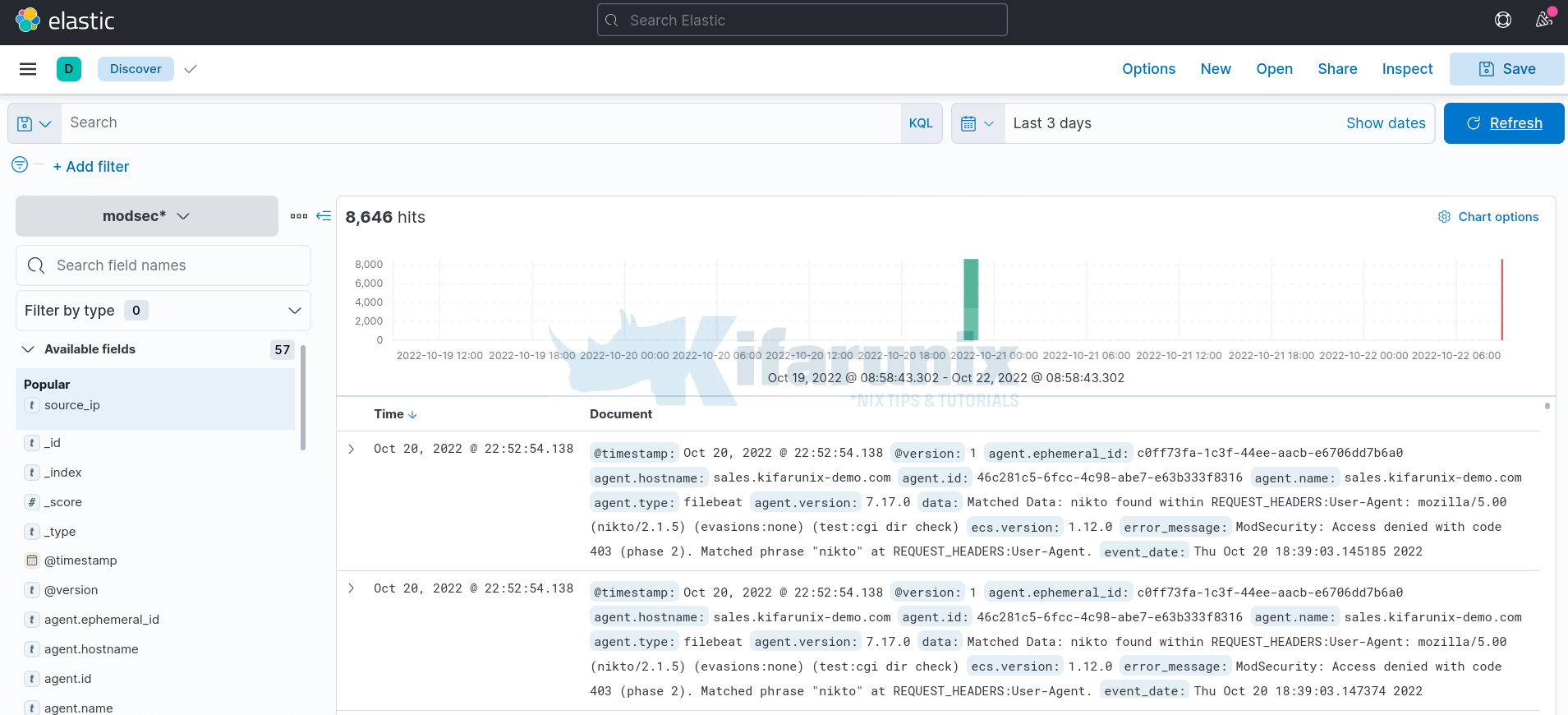This is a simple tutorial on how to search and delete specific records from Elasticsearch index. Elasticsearch ships with a delete_by_query API that enables you to search Elasticsearch index for records that matches a specified query and delete them.
Delete Specific Records from Elasticsearch Index
Required Permissions
Note that if the security features are enabled on your Elasticsearch cluster, you need to have the the following permissions to use delete_by_query API, you need to delete records.
readdeleteorwrite
Delete Specific Records from an Index
Consider our demo index, show in the screenshot below with a total of 8646 event records in a period of 3 days

Checking the count from the command line (modsec, is our index);
curl -XGET http://elk.kifarunix-demo.com:9200/modsec*/_count?prettySample output;
{
"count" : 8646,
"_shards" : {
"total" : 1,
"successful" : 1,
"skipped" : 0,
"failed" : 0
}
}Out of these records, there are some notice events that I do not really want from my index.
curl -XGET -H 'Content-Type: application/json' http://elk.kifarunix-demo.com:9200/modsec*/_count?pretty -d '{
"query" : {
"match" : { "message": "notice" }
}
}'Sample output;
{
"count" : 69,
"_shards" : {
"total" : 1,
"successful" : 1,
"skipped" : 0,
"failed" : 0
}
}We have 69 such records;
So, if you know the Elasticsearch field that has the keyword that you want to delete, then it becomes easy to use the delete_by_query API.
For example, to delete the above notice messages, the field is message and the keyword is “:notice“.
You can run the delete_by_query from Kibana > Management > Dev Tools > Console or from the terminal command line.
To delete from Kibana DevTools console, paste the query below and press the play button to execute the query command;
NOTE: modsec* is our index with (wildcard, * to match all indices whose names starts with modsec}.
To search all data streams and indices, omit this parameter or use * or _all.
POST /modsec*/_delete_by_query
{
"query": {
"bool": {
"must": [
{
"match": {
"message": ":notice"
}
}
]
}
}
}

From command line, you can use a command;
curl -XPOST "http://elk.kifarunix-demo.com:9200/modsec*/_delete_by_query?pretty" -H 'Content-Type: application/json' -d '{
"query": {
"bool": {
"must": [
{
"match": {
"message": ":notice"
}
}
]
}
}
}'
It is also possible to further refine the query, for example, to delete specific event data record from specific host.
Consider the query below;
POST /test*/_delete_by_query
{
"query": {
"bool": {
"must": [
{
"match": {
"hostname": "sales.kifarunix.com"
}
},
{
"match": {
"source_ip": "xx.xx.xx.xx"
}
}
]
}
}
}
When executed, it will search for events sent by the host sales.kifarunix.com (field is hostname)and contain source_ip: xx.xx.xx.xx and delete them;
You can run the above command on Kibana dev tools console or from command line.
You can also delete documents with a missing field.
For example, to delete records from the index logstash* sent by the host sales.kifarunix-demo.com and doesnt have a field called status_code, you could use such a delete query;
The search query below give total number of search events.
POST /logstash*/_search
{
"query": {
"bool" : {
"must" : {
"match" : { "host.name" : "sales.kifarunix-demo.com" }
},
"must_not" : {
"exists" : { "field" : "status_code" }
}
}
}
}

To delete these events;
POST /logstash*/_delete_by_query
{
"query": {
"bool" : {
"must" : {
"match" : { "host.name" : "sales.kifarunix-demo.com" }
},
"must_not" : {
"exists" : { "field" : "status_code" }
}
}
}
}

You can play around with query. Be careful not to delete your important records!!

